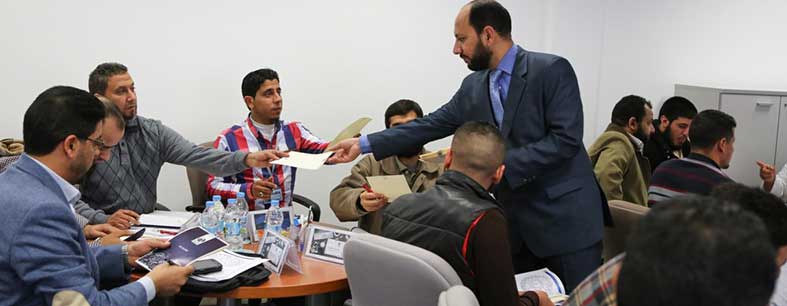Sitting in classroom in a Benghazi Institute, 25 students listen as their tutor enthusiastically emphasises a point during an open discussion on problem-solving. The 5-day course is just one part of a wider training programme teaching leadership development and strategic planning designed and delivered by the Warriors Affairs Commission Leadership Project.
The enthusiastic and articulate teacher is Doctor Ibrahim Mensi of the Jadara University in Jordan, who said: “The main objectives of the course are to teach the basics and specifics of leadership science. We look at how it can improve the ability and behaviour of leaders, and how to deal with overall decision-making and crisis and problem solving.”
This particular programme will train a total of 400 former Thuwar from all across Libya in the basics of leadership and strategic planning as part of a variety of education and reintegration programmes established by the Warriors Affairs Commission (WAC) to help reintegrate former Thuwar and rebuild Libyan society. Younis Ali Younis, WAC Leadership Development Project Manager, said that the 97 best will travel to Dubai in April to further study government administration and management.
Students on the training programme gave the WAC a very positive report and praised the Leadership programme.
Mohamed Ghuwil, a consultant engineer and former Thuwar from Bengahzi who has joined the programme, believes the training is the first step for Libyans to manage their own country. “The course talks about structure and leadership, which are important for us. We have to know how to build human capacity as well as rebuilding our country using just bricks.”
The course has shown him and other students how to impress positively on other people and has taught them more about themselves. “I’ve discovered new things that I didn’t know I had; It has taught me strategic ways to face problems ahead. People need this kind of course to help and change their way of thinking,” he says.
Osama El Mehdawi, also from Bengahzi and an employee of the Ras Lanuf Oil and Gas Processing Company (RASCO), who during the revolution taught fighters how to use GPS and applications such as Google Earth to navigate, plan and use terrain and topography to their advantage when engaged in combat, adds that the course has been very helpful. “It has changed my way of thinking in life, for a better life. It has taught me how to manage my time better, to communicate better with other people and express my thoughts and points of view.”
Speaking at the end of another lecture, Dr. Mensi said that Libya has lost the experience of discussion and dialogue with others that they need to meet the challenges of rebuilding the country and taking it forward. “They need these skills to make life better and the ability to take these skills and apply them both theoretically and practically. We are teaching them a model of A-Z leadership and planning and how to apply these skills and techniques in their places of work and how to empower more people.”
Osama agrees, and says he is looking forward to sharing what he has learnt. “I want to encourage and help others, colleagues and friends, at my place of work to achieve their goals, to learn and share ideas.”

